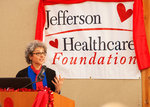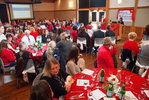Jefferson Healthcare cardiac patients may soon be able to benefit from the addition of two Trendelenburg chairs – designed to keep patients’ legs higher than their heads during procedures to keep …
This item is available in full to subscribers.
We have recently launched a new and improved website. To continue reading, you will need to either log into your subscriber account, or purchase a new subscription.
If you had an active account on our previous website, then you have an account here. Simply reset your password to regain access to your account.
If you did not have an account on our previous website, but are a current print subscriber, click here to set up your website account.
Otherwise, click here to view your options for subscribing.
* Having trouble? Call our circulation department at 360-385-2900, or email our support.
Please log in to continue |
|


Jefferson Healthcare cardiac patients may soon be able to benefit from the addition of two Trendelenburg chairs – designed to keep patients’ legs higher than their heads during procedures to keep blood flowing to the brain – as a result of the sold-out third annual WellHearts fundraising luncheon.
Judy Tordini, a nurse and the president of Jefferson Healthcare Foundation, said she didn’t yet know how much money was raised at the fundraiser, but said it was likely to be enough to purchase one or two of the special chairs. The goal is to eventually acquire three of the chairs.
More than 144 people attended the event, which was held at the Northwest Maritime Center Feb. 2. Attendees wore red clothing as a reminder to everyone to take care of their cardiovascular health.
“Apparently this is like the hottest ticket in town,” said Jefferson Healthcare CEO Mike Glenn at the event, joking that it was easier to get tickets to the Broadway musical “Hamilton.”
Proceeds from sales of the $50 tickets went to the Jefferson Healthcare Foundation. The foundation has raised more than $409,000 over the years, and helped the hospital to purchase a 3-D mammography tool, a microscope for the Women’s Clinic, a nuclear camera and patient robes, Tordini said.
NO. 1 KILLER
At the luncheon, Tordini said that too many women are dying from heart attacks and cardiovascular disease, which is the no. 1 killer worldwide.
Cardiovascular disease is mostly preventable through lifestyle changes and education, she said.
Dr. Karen Forbes of Jefferson Healthcare thanked the audience for supporting the foundation and said cardiovascular disease leads to many problems, such as stroke, kidney failure, high blood pressure and blindness.
“Although the death rate from cardiovascular disease is decreasing, the prevalence is increasing,” Forbes said.
“The American Heart Association predicts that by the year 2030, 40 percent of the U.S. population will have some form of cardiovascular disease,” Forbes said.
But on the plus side, “Ninety percent of the risk of heart attack is due to modifiable risk factors, meaning that they are under your control,” Forbes said, referring to choices people could make regarding diet and cholesterol.
Risk factors for cardiovascular disease include a sedentary lifestyle and lack of exercise.
Forbes said exercise “is the miracle drug” that can reduce cardiovascular disease, the risk of heart attack, diabetes, the risk of cancer, and pain levels; improve cholesterol, lung function and cognitive function; and strengthen bones, she said.
One should exercise moderately at least two and a half hours per week, she said, with seven hours being ideal.
“It will cure what ails you, and I cannot stress this enough … exercise will do more for your health than any other thing that you can do,” including reducing mortality, for all ages, she said.
“The take-home point from this slide is ‘Keep moving.’”
Even a minor thing such as sitting up instead of reclining can be helpful, she said, adding that standing is better than sitting, and moving is better than standing.
“Your overall health is in your hands,” Forbes said.
Forbes advocates a diet that is mostly plant-based.
“I don’t mean to offend anyone out there, but we should not be eating beef anymore. It is no longer sustainable on this planet … beef production uses more land and fresh water and produces more greenhouse gas per unit of protein than any other commonly consumed food.”
About 2,500 gallons of water are needed to produce 1 pound of beef, she said.
“That’s the equivalent of taking a shower daily for six months.”
FAMILY-DINNER MEMORY
Keynote speaker and nurse Jackie Levin recalled a family dinner with her mother and two older siblings.
“My mom began to feel a little weak. She became sweaty, pale and nauseous,” Levin recalled.
Levin was concerned.
“Even though I said, ‘This is her heart,’ everybody else said, ‘No, it’s not. She just needs a little bit of something to eat, a little bit of something to drink and she’ll be fine.’
“Well, she was fine a bit later … but that kept nagging at me,” so Levin had her mother visit a cardiologist. The doctor found a 90 percent blockage in two of her mother’s arteries. Stents were put in place to deal with the problem, and her mother is doing well today.
Warning signs for cardiovascular disease included chest pain, nausea, light-headedness, feeling tired, discomfort in an arm, and shortness of breath, she said.
“One in three women will die of cardiovascular disease … so if we look around this room, that means one-third of us will die of cardiovascular disease” if no changes are made, Levin said of what she called a “public health crisis.”
Cardiovascular disease is the leading cause of death worldwide “and it’s largely preventable,” Levin said.
Chronic stress is one factor that’s making the disease to be such a problem.
To alleviate stress, one should share time with friends and family, spend time in nature, be active and reduce workplace stress.
Workspace stress could be reduced in part by simply smiling at coworkers or feeling grateful for someone who makes coffee.
“Your heart is a pump, and it has those four chambers … I just want you to realize what your heart is doing for you,” Levin said, noting that on average the fist-size human heart beats 80 times per minute, 4,800 times per hour, 115,000 times per day, 800,000 times per week, 3 million times a month and 38 million times every year.
“OK, it might skip now and then … but this is what your heart is doing for you every day,” she said.